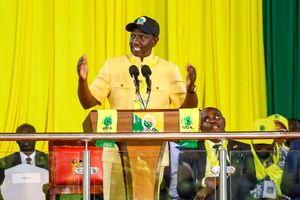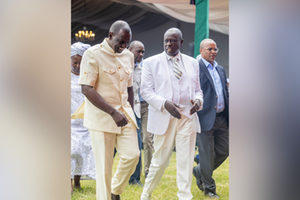
President William Ruto.
President William Ruto ascended to power against all the odds in September 2022 and quickly made calculative political manoeuvers to a point that many observers believed he would easily secure re-election.
In quick succession, President Ruto poached several opposition politicians, including some from ODM leader Raila Odinga’s Nyanza bastion and made political deals with some of the Azimio La Umoja One Kenya Coalition affiliate parties that consequently handed him an outright majority in both the National Assembly and the Senate. He also succeeded in managing any potential post-election fallout within his Kenya Kwanza alliance by rewarding some of the key players in his campaigns with plum government positions.
He rewarded Musalia Mudavadi with the Prime Cabinet Secretary slot, Moses Wetang’ula was handed National Assembly Speaker with Amason Kingi taking up the Senate Speaker position as per the pre-election agreement. President Ruto also rewarded Dr Alfred Mutua and Moses Kuria with Cabinet slots.
Signature projects
The President also pushed through some of his signature projects such as the Hustler Fund that provided cheap loans for the majority downtrodden. He also made available subsidised fertiliser, bringing down the cost of production while handing a bigger profit margin.
His surprise endorsement of Odinga for Africa Union Commission (AUC) chairmanship capped his major political wins, with observers noting that with the former premier out of local politics, Dr Ruto had managed to weaken the opposition. It was also believed that the support for Odinga would have endeared him to his support base ahead of 2027. But his well-laid plans seem to have hit a major political storm. A wave of revolt by the youth – who form a major voting bloc – over high taxation and an aggressive falling-out with his deputy Rigathi Gachagua are now threatening Dr Ruto’s re-election plan.
Mt Kenya, where Gachagua comes from, voted Dr Ruto to the last man. His allies have since threatened to lead the region away from the President should the second in command be frustrated.
More than 17 regions across the country, including Dr Ruto’s Eldoret home town, witnessed protests as young Kenyans turned up to voice their opposition to the Finance Bill, 2024. A wheelbarrow, the symbol of the ruling United Democratic Alliance (UDA), was brought down in Eldoret when protesters poured into the streets of Eldoret in what could only be equated to the euphoria that greeted Dr Ruto’s win.
There is a general feeling by Kenyans that President Ruto and his Kenya Kwanza administration have failed to fulfil his pre-election promises. Dr Ruto rode to power on lofty promises to create jobs for millions of unemployed youths, prioritise the needs of low-income earners and bring down the cost of living.
But his first budget, which took effect on July 1, made life more expensive. Salaried Kenyans have had their take-homes significantly reduced with small businesses hit hard by new taxes. The contentious Finance Bill, 2024 currently before the National Assembly has proposed additional taxes while adjusting some of the existing ones. President Ruto was on Tuesday forced to climb down on some of the proposed new taxes, including a 16 per cent VAT on bread, 2.5 per cent car circulation tax and excise duty on edible oil.
“What makes things harder for the government is that economic downturn and rising poverty are not something the government can wish away. So, Ruto will have to renegotiate with foreign donors and multilateral lenders to adjust Kenya’s debt portfolio because raising taxes to raise revenue to pay debt is not only politically delirious, but it can also reduce consumption and hurt the economy further,” says Prof David Monda, a political analyst.
Tax policies
Prof Macharia Munene, another university don, describes President Ruto as a lone ranger who does not advise or opinions from other people. Prof Munene says more Kenyans are becoming poorer because of not well-thought tax policies that have only managed to kill businesses and stifle any potential job opportunities for the unemployed youths. “He has not delivered on the many promises he made to people. More people are becoming poorer. Public universities cannot pay salaries. Lecturers go for months without pay. There is a general underdevelopment and the effect is the anger you see in the streets,” says Prof Munene.
“On the other hand, we have some politicians and those in the executive showing off wealth that they cannot account for. Some have bought wristwatches worth millions. Others are driving in convoys that are a kilometer long. The youth are seeing these displays of opulence,” notes Prof Macharia. Many pre-election promises remain unfulfilled and the jury is still out on the impact of those that have started like Housing in which Kenyans were forced to contribute for as well as the Hustler Fund.
There is also growing criticism over extravagance and wastage of public resources and constant foreign trips by the President. Perception that the President and his top officials are arrogant, entitled and not averse to display of conspicuous consumption through their dressing and vehicles — and often contributing huge amounts in harambees have also worsened the matter.
“Public perception is also another image problem for Ruto. Specifically, the high-handed and repressive way the police dealt with peaceful protesters. The Gen Z who, for the first time, shifted from being keyboard warriors to activists on the street petitioning and challenging their government. This is a new phenomenon in Kenyan politics and complicates the domestic political context because this particular Gen Z population are mostly middle class, educated, aspirational and desirous of changing government,” observes Prof Monda. Some of Dr Ruto allies claimed that the nationwide protests were not organic but politically motivated. They claimed that the youth had been misled to protest against the Finance Bill without any solid justification.
“The youth demonstrating are so ignorant that they think the Finance Bill is an invention of William Ruto. They say they do not want taxes but want more money for education,” Tourism Cabinet Secretary Mutua told The Weekly Review.
“Ask any of the youth why they oppose the Bill and they will vomit propaganda. They are being used. I feel sorry for them because they think they are right about the issues but as I always say, I do not have to agree with them but will defend their right to express their opinion. Finance Bill, 2024 raises revenue for all expenditures including medical care, electricity, water, petroleum and the services we take for granted including provision of security.
What they need to question and express their opposition are areas in the budget estimates they do not agree with,” said Dr Mutua. Kimilili MP Didmus Barasa said it would be unfair to judge President Ruto within two years in office. Barasa said the promise made by Kenya Kwanza was to be delivered in five years. Barasa came close to blaming Gachagua for the anti-tax protest when he said a senior government official was involved in their mobilization. He could, however, not provide any evidence to support his claims.
“It would be premature to start gauging our performance at this time. The government has been in office for barely two years when the promises we made were to be delivered in five years,” he said. In Mt Kenya that secured President Ruto’s win against an onslaught by his predecessor Uhuru Kenyatta, Gachagua is already fomenting dissent. He has dared those opposed to the region’s unity call to face the people. “If you think the talks of unity are not good, do not talk in Rift Valley or Western, come here and call for a gathering and tell the people why unity is not good. They should come and speak from here,” Gachagua said on Wednesday.
Tremendous respect
“I want to advise our leaders with tremendous respect, please our leaders, all politics is local, listen to your people, listen to the ground. Align your thinking and your utterances with the people, that is what I do all the time. I listen to the ground,” he said.
His allies have threatened to lead the region away from Dr Ruto should the second-in-command be frustrated in government. “The feeble attempts at fighting DP Riggy G, will ultimately bring the mountain together and keep the mountain solidly behind him. Betrayal is sacrilegious for the mountain,” Nyeri Governor Mutahi Kahiga recently warned.
Prof Monda notes that “the recent divisions within his governing coalition have not helped matters. A house divided against itself, cannot stand. This is another domestic political problem Ruto will have to address especially as political rivals jostle for position in view of the elections of 2027.” At the same time, some of the ODM rebels who have been supporting his agenda on the floor of the House on Thursday abandoned him by rejecting the Finance Bill.
MPs Mark Nyamita (Uriri), Elisha Odhiambo (Gem), Felix Odiwuor (Langata) and Esther Passaris (Nairobi) voted against the Bill. “To be fair, an essential staple food for the majority, like bread, does not deserve enhanced Value Added Tax (VAT) just like taxing sugarcane transportation amounts to double jeopardy: because sugarcane millers maintain almost all the marram roads they use,” said Nyamita.
Finance Bill
During the debate, Odiwuor said he had to make the choice of rejecting the Bill because of some of the proposed taxes that have a potential of making life more expensive. “First of all, I reject the Finance Bill 2024. Immediately it touched around everything that touches the common person. I had to make the choice that I am making today. Most of you know, I am a friend of the President and I spoke to him and he knows very well that this is my stand,” said Odiwuor.
Ms Passaris, who also in the last Finance Bill defied ODM and voted with United Democratic Alliance (UDA) MPs, said the government needs to listen to the views of Kenyans. “If we address corruption, we will be able to fund the expenses of this government. It is time we take a position that corruption is the biggest enemy in the room,” she said.
National Assembly Minority Leader Opiyo Wandayi told The Weekly Review that the opposition expects more leaders who went to bed with the ruling alliance to rejoin Azimio in putting more pressure on the regime that he said has failed the people. “The honeymoon is over. It is time for a reality check and we expect more members to join hands with us because they have realised the people are not on the government side,” said Wandayi. Despite government endorsement for the AUC job, Odinga has also remained the unpredictable Odinga.
Dr Ruto is also stuck with many disgruntled mid-level political players who are still waiting for rewards — mostly through the discredited Chief Administrative Secretary (CAS) positions. Some of them, like Kimani Ngunjiri and Cate Waruguru, have openly rebelled and joined Gachagua’s camp.











